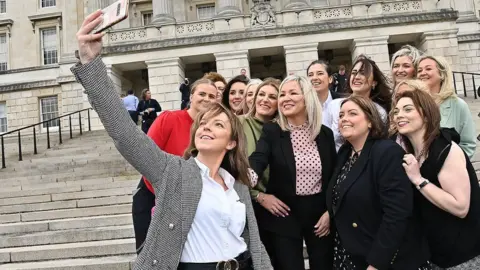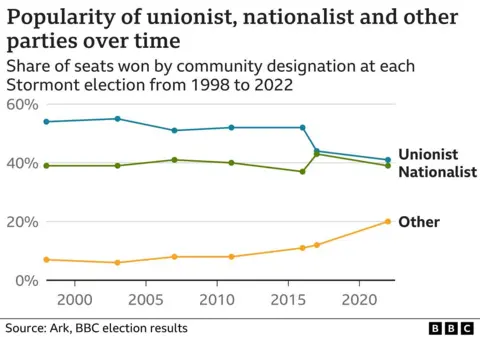NI election 2022: DUP blocks new NI government in protocol protest
The DUP will not go back into government in Northern Ireland until its concerns about post-Brexit trading arrangements are resolved, the party's leader has said.
Sir Jeffrey Donaldson was among the party leaders to meet NI Secretary Brandon Lewis in Belfast on Monday.
Thursday's historic election saw Sinn Féin become Stormont's largest party.
Would-be first minister Michelle O'Neill said there could be no attempt by the DUP to "punish the public".
Ms O'Neill and Sinn Féin president Mary Lou McDonald held talks with Mr Lewis, who also met the leaders of the Alliance Party, Ulster Unionist Party (UUP) and Social Democratic and Labour Party (SDLP).
The Democratic Unionist Party (DUP) is resisting pressure from the UK and Irish governments, as well as Northern Ireland's other main parties, to nominate ministers after the dramatic election result.
For months, the DUP has protested against the Northern Ireland Protocol, part of the UK's Brexit deal with the European Union which retains free trade across the Irish border.
It has angered some unionists for introducing new checks on some goods moving across the Irish Sea.
They also say it undermines Northern Ireland's place in the UK.
In his meetings on Monday, Mr Lewis urged the party leaders to respect the outcome of the election on Thursday and re-establish Stormont as soon as possible.
He said the government would have to address issues relating to the protocol and "continue to press the EU to agree the crucial changes that are urgently needed".
The NI Secretary stated that he will remain in close contact with all the party leaders over the coming days.
'Game of chicken'
Sinn Féin, whose ultimate goal is for Northern Ireland to leave the UK and become one country with the Republic of Ireland, won the most seats - 27 out of 90 - after Thursday's vote.
This means the party can nominate Northern Ireland's first minister, an unprecedented move for a nationalist party, but it is reliant on the Democratic Unionist Party (DUP) taking up its position as deputy first minister.
The roles form a joint office, with equal responsibility, however, the allocation of the titles is regarded as symbolically important.
Sir Jeffrey said his party would not nominate ministers until there had been "decisive action" on the protocol.
 Pacemaker
Pacemaker"They (UK government) gave a firm commitment to protect our place in the UK internal market," Sir Jeffrey said.
"They have not done so, they have failed over the last two-and-a-half years to honour that commitment."
But Ms O'Neill said the DUP and the UK government must respect the election's outcome, and that it was down to Boris Johnson and the EU to resolve differences over the protocol.
"Brinkmanship will not be tolerated where the north of Ireland becomes collateral damage in a game of chicken with the European Commission," she said.
"Make no mistake, we and our business community here will not be held to ransom."
While some assembly members (MLAs) were at Stormont on Monday, the legislative body will hold its first sitting on Friday, when members will register and designate as unionist, nationalist or other.

- GOVERNMENT CRISIS: What happens next?
- HISTORIC MOMENT: From IRA politics to NI's biggest party
- SINN FEIN: What does the party want?
- THE ASSEMBLY: How power-sharing works in Northern Ireland
- RESULTS: The assembly election in maps and charts
- POSTCODE SEARCH: What are the results in my area?

On Monday, Taoiseach (Irish prime minister) Micheál Martin said the DUP was wrong to place conditions on power-sharing.
"The mandate they all got was to take their assembly seats and get into the executive," he told broadcaster RTÉ.
Mr Martin said the EU had signalled its intention to make the Northern Ireland Protocol work more effectively, but that it would not be removed.


Today is a mixture of first day of school, a wedding and a wake - a lot of people all dressed up with nowhere really to go.
The only meeting some would say Brandon Lewis needs to have is with the DUP.
There is also an interesting leaders' meeting which will be led by Michelle O'Neill, the would-be first minister if there was anybody to be deputy first minister.
But all of that will lead nowhere unless someone can persuade the DUP to set aside its difficulties on the protocol.
MLAs are due to sign the Stormont register on Friday (the 13th if you're superstitious).
If that goes well, they will elect the speaker and are supposed to elect the first and deputy first ministers - and that is where the first big problem happens.

Ireland's Foreign Affairs Minister Simon Coveney is expected to meet Brandon Lewis later.
Meanwhile, the EU's chief negotiator Maroš Šefčovič has urged the UK to "dial down the rhetoric" about the protocol.
He said the UK needed to "be honest" about what it had committed to.


Kellie Armstrong, from the Alliance Party, said there would be a "zombie assembly" if the DUP did not respect the outcome of the election.
"If they really cannot abide being deputy first minister then they have the option of opposition and then they can hold the government to account," she told BBC Radio Ulster's Talkback programme.
"But for goodness sake at least let the rest of us get on with doing some work."
Ulster Unionist Party (UUP) leader Doug Beattie said that if the Northern Ireland Protocol was the obstacle to a functioning executive at Stormont, then it needed to be dealt with.
"We all know what the landing zone is, no checks on goods from Great Britain to Northern Ireland if they are staying in Northern Ireland. That gets rid of the border down the Irish Sea.
"The EU Commission know this, the UK government know this and all five political parties who would form the executive know this also."
On Monday, SDLP leader Colum Eastwood said his party was now in opposition as it does "not have a mandate for government".
The party lost four seats and returns to the assembly with eight MLAs.
Mr Eastwood, the Foyle MP, said his party would not replace its deputy leader Nichola Mallon, who lost her seat, as infrastructure minister.
Border poll within five years?
The victory for Sinn Féin in this election does not mean a vote on Irish unification - also known as a border poll - is imminent.
The Northern Ireland Act 1998 - which followed the signing of the Good Friday Agreement peace deal - stated that Northern Ireland remained part of the United Kingdom and "shall not cease to be so without the consent of a majority of the people of Northern Ireland voting in a poll".
It also stated that the Northern Ireland secretary should agree to hold a poll if it appeared likely that a majority of people wanted a united Ireland.
Successive opinion polls suggest that is not yet the case, with the most recent, published in April, putting support at about a third.
Although Sinn Féin's vote rose at the election, the combined vote for the main parties which support a border poll - Sinn Féin, the SDLP, People Before Profit and Aontú - fell.
Sinn Féin leader Mary Lou McDonald said planning for a unity referendum would come within a "five-year framework".
After her meeting with the NI secretary on Monday, she said she expected mention of Irish Language legislation in Tuesday's Queens Speech.
Stormont stalemate?
It is still not clear whether the DUP leader Sir Jeffrey Donaldson, who is currently an MP, will take his seat at Stormont, or hand it over to a party colleague and stay at Westminster.
If he decides to remain as a member of parliament, it will be seen as a sign that he feels the Stormont stalemate will continue for the foreseeable future.
The DUP lost three seats in last week's election but fared better than some opinion polls had predicted.
The only party to gain seats after the election was the cross-community Alliance Party, now Stormont's third largest, after it more than doubled its representation to 17 seats.
Elsewhere, the UUP also lost a seat, finishing with nine MLAs, while the Green Party lost its two seats.
Traditional Unionist Voice (TUV) leader Jim Allister retained his place at Stormont, as did Gerry Carroll of People Before Profit and two independent unionists, Claire Sugden and Alex Easton.
Although Sinn Féin is the largest party, there are still more unionists than nationalists at Stormont, 37 to 35.
The new assembly is the seventh to be formed since the Good Friday Agreement in 1998.
